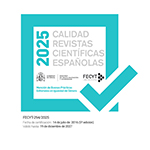Literature and Multilingualism: Analysis of an Experienced Language (erlebte Sprache)
Abstract
Our research framework, called intercultural poetics, seeks to answer the question of how literary language behaves in intercultural writers, i.e., those authors who have more than one language at their disposal for creation – e.g., their mother tongue and the host country language. What literary devices do they prioritise? Do such uses involve a redefinition of traditional literary concepts? In previous articles a description has been made of some of the procedures relating to the language of writing and the latent language. In this article we will show how these authors work with a third language as an experienced language (erlebte Sprache), by exemplifying with the case study of German as the language used in Nazi concentration camps in Jorge Semprún’s novel Le mort qu’il faut (2001). We will also explain the specific use of multilingualism in European intercultural literature as an invitation to identify similar phenomena in other writers.Downloads
Article download
License
In order to support the global exchange of knowledge, the journal Revista de Filología Alemana is allowing unrestricted access to its content as from its publication in this electronic edition, and as such it is an open-access journal. The originals published in this journal are the property of the Complutense University of Madrid and any reproduction thereof in full or in part must cite the source. All content is distributed under a Creative Commons Attribution 4.0 use and distribution licence (CC BY 4.0). This circumstance must be expressly stated in these terms where necessary. You can view the summary and the complete legal text of the licence.










